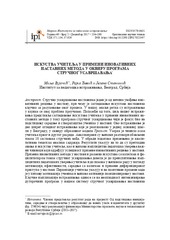Приказ основних података о документу
Class teachers' experiences in implementing innovative teaching methods within the in-service training programmes
| dc.creator | Vujačić, Milja | |
| dc.creator | Đević, Rajka | |
| dc.creator | Stanišić, Jelena | |
| dc.date.accessioned | 2021-03-17T13:38:13Z | |
| dc.date.available | 2021-03-17T13:38:13Z | |
| dc.date.issued | 2017 | |
| dc.identifier.issn | 0579-6431 | |
| dc.identifier.uri | http://ipir.ipisr.org.rs/handle/123456789/280 | |
| dc.description.abstract | Teacher in-service training is one of the ways to introduce innovative solutions to teaching, whereby obtaining an insight into teachers' experiences proves to be vital for understanding this process. In our country, the studies dealing with this problem are fairly rare. Using this as a starting point, the aim of our study was to obtain an insight into class teachers' experiences in implementing innovative teaching methods during the in-service training programmes whose focus was on encouraging the cooperation and creativity of students during classes. This study is a part of a more extensive experimental research that was conducted at a primary school in Belgrade within the Trefoil educational model. The sample included eight first-grade and second-grade class teachers, whose conversations, which took place during ten meetings of the teachers' board, were analysed. A qualitative thematic content analysis was used in data processing. The results indicate that the previous knowledge and experience of class teachers, as well as their implicit pedagogical beliefs, are important factors which determine the successfulness of the implementation of innovative solutions in teaching. The implementation of innovative methods in teaching and the exchange of experiences with colleagues and the facilitator during the in-service training have contributed to the re-examination of class teachers' implicit pedagogical beliefs and the shift in their work with respect to motivation, effectiveness, cooperation with colleagues and implementing a differentiated approach in teaching. Class teachers' perceptions also point towards the positive changes when it comes to students' motivation and their more active positioning during classes. The key implications of the current study refer to the necessity of intensifying the long-term programmes in our in-service teacher training system that would create the necessary conditions for a more successful implementation of innovative solutions in teaching. Finally, it is also pointed out to the limitations of the current study. | en |
| dc.publisher | Institut za pedagoška istraživanja, Beograd | |
| dc.relation | info:eu-repo/grantAgreement/MESTD/Basic Research (BR or ON)/179034/RS// | |
| dc.rights | openAccess | |
| dc.rights.uri | https://creativecommons.org/licenses/by-nc-nd/4.0/ | |
| dc.source | Zbornik Instituta za pedagoška istraživanja | |
| dc.subject | innovative teaching methods | en |
| dc.subject | class teachers' experiences in implementing innovative teaching methods | en |
| dc.subject | in-service training programmes | en |
| dc.subject | teachers' board | en |
| dc.title | Class teachers' experiences in implementing innovative teaching methods within the in-service training programmes | en |
| dc.type | article | |
| dc.rights.license | BY-NC-ND | |
| dc.citation.epage | 260 | |
| dc.citation.issue | 2 | |
| dc.citation.other | 49(2): 234-260 | |
| dc.citation.rank | M24 | |
| dc.citation.spage | 234 | |
| dc.citation.volume | 49 | |
| dc.identifier.doi | 10.2298/ZIPI1702234V | |
| dc.identifier.fulltext | http://ipir.ipisr.org.rs/bitstream/id/147/277.pdf | |
| dc.identifier.scopus | 2-s2.0-85042454197 | |
| dc.identifier.wos | 000435844800005 | |
| dc.type.version | publishedVersion |

